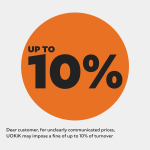
- How big is the discount? Temu customers may not know.
- Failing to inform consumers of the lowest price from the 30 days preceding a promotion – or providing false pricing – are the allegations raised by the President of UOKiK.
- Temu faces a fine of up to 10 percent of its turnover.
The Temu website is one of the largest purchasing platforms with Chinese capital. Through the site, third-party sellers offer a wide range of products, including clothing, cosmetics, electronics, and household items. The company responsible for the sales in Poland is the Irish company Whaleco Technology Limited with its registered office in Dublin. The President of UOKiK, Tomasz Chróstny, charged the company with presenting promotional prices in a manner inconsistent with the law.
The lowest price in the last 30 days before the discount
The President of UOKiK examined how consumers are informed about promotional prices on the Temu website and whether the lowest price from the 30 days prior to the discount is being reliably disclosed. An analysis of the website and mobile app revealed that platform users may not always be aware of the actual scale of a promotion – either because no reference price is provided, or because the reference used may be inaccurate.
– The obligation to provide reliable price information applies at all stages of the sales process – from advertising messages to the conclusion of the contract. Wherever a discount is communicated, information about the lowest price from the 30 days preceding the discount must be included. The purpose of this requirement is to prevent false promotions. The lowest price from the 30 days before the reduction allows consumers to assess whether an offer is genuinely beneficial – said Tomasz Chróstny, President of UOKiK.
The way the discount is presented is irrelevant – whether it is expressed as a percentage or a numerical value, with verbal slogans or graphic symbols (e.g. “sale”, “special offer”, promotions tied to occasions, “cheaper”, “save”, “more advantageous”, a percentage or minus sign, strikethroughs, or a comparison of prices). Each time, and in every place where such a message appears, the lowest price from the 30 days prior to the announcement of the reduction must also be clearly provided. On the Temu website, this applies, among others, to the product selection stage (listing), the product page, and the virtual shopping cart. However, as the UOKiK analysis shows, the company does not consistently provide this required information. Inconsistencies may even apply to different variants of the same product. Although each variant is offered at a promotional price at the same time, only some sizes or colours display the lowest price from the 30 days before the discount.
Were customers misled?
The President of UOKiK also found that in some cases – despite the price at which the product was offered to buyers changing over several days – the lowest price from the 30 days prior to the reduction remained unchanged.
One example is a set of foil balloons, whose promotional price ranged from PLN 10.07 to PLN 14.38 over several days. Despite this, consumers consistently saw the lowest price from the 30 days before the promotion as PLN 18.48. While this may have been accurate when the discount was first introduced, once the price changed, the lowest prior price should also have been updated.
Similar irregularities affected other products, such as an LCD projector. Promotional sale price: PLN 849.02; lowest price 30 days before the discount: PLN 960.99. A few days later, a new offer appeared – this time with a promotional price of PLN 891.61 – yet the lowest price from 30 days prior remained unchanged at PLN 960.99.
– The lowest price valid 30 days before the promotion was announced is key information to verify the reliability of the discount. If it is false, the consumer may overpay, thinking they are buying at a bargain price. Promotions constitute a strong purchasing impulse, often leading to unplanned purchases. Entrepreneurs must ensure that all information they provide is up to date – said Tomasz Chróstny, President of UOKiK.
An important element
As shown by the UOKiK study “The Impact of Promotions on Purchasing Behaviour”, as many as 82% of respondents are influenced by promotions and discounts when choosing an online store. These factors significantly affect the entire consumer decision-making process – from the first contact with an advertisement, through focusing on specific products in the store, to the final choice and purchase. The majority of surveyed consumers – 85% – are familiar with the concept of the “lowest price in the 30 days before the discount”, but 56% report difficulties in finding this information when using discounts. Among those familiar with the term, 84% compare the current price to the lowest price from the 30 days before the discount when shopping.
Nearly 70% of respondents indicate the need to display the lowest price from 30 days before the discount on the product label when announcing percentage promotions. What’s more, this information is, for most of them – 61% – a sufficient point of reference to assess the value of the discount.
During the survey, consumers were also asked to assess the actual value of a promotion based on sample graphics. The results revealed the presence of an anchoring effect in the percentage reduction figure. Respondents often interpret this figure uncritically, and the stated value – even if it does not relate to a genuine markdown but rather to an unspecified “recommended price” or a discount on a second product – is often accepted as the actual discount amount.
The President of UOKiK has explained in the Explanations for Entrepreneurs that the size of the discount should be calculated based on the lowest price from the 30 days prior to the promotion, and has outlined how to correctly label promotional offers. UOKiK also continuously monitors how this lowest price is presented – both in brick-and-mortar stores and online. The rules for displaying reduced prices, as set out in the Omnibus Directive, apply universally across all industries. UOKiK is currently conducting six proceedings concerning the incorrect presentation of discount information. The following companies have been charged: Zalando, Media Markt, Sephora, Glovo, Shell Polska, and AzaGroup (operator of Renee and Born2Be stores). In addition, it has issued over 70 soft calls.
Information for the media
| +48 603 124 154 | |
| biuroprasowe@uokik.gov.pl | |
 | pl. Powstańców Warszawy 1 00-950 Warszawa |
Follow us
Help for consumers
| 801 440 220 | +48 222 66 76 76 operator fee | |
| poradydlakonsumentow.pl contact form | |
 | Consumer Ombudsmen in your town or district |
 | Trade Inspection in your province |




















